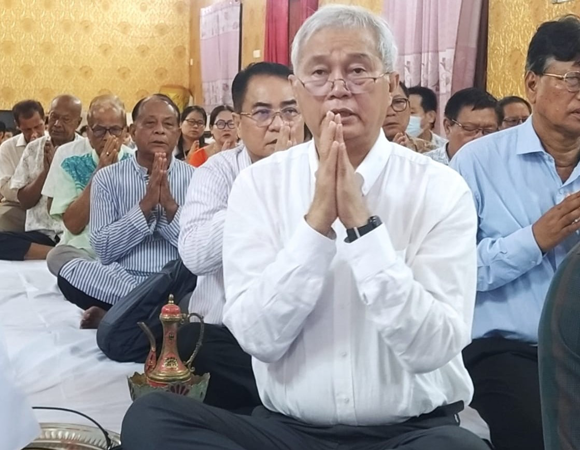China tightens access for Myanmar migrant workers entering from Shan State

China has tightened access for Myanmar citizens entering the country on temporary border passes (TBPs) from Muse in northern Shan State, residents of the border town say, The Irrawaddy reports.
Migrants seeking work at factories and plantations in and around Ruili, in Yunan province, have had to get health checks and drug tests at the Chinese government’s labor office in Jiegao since March 5.
Muse residents explained that migrant workers entering China now have to prove they are physically fit and drug-free. They also need letters from Chinese employers saying they have a job.
After passing the tests and submitting a letter from their employer, migrants then receive a QR code to enter Ruili. Without the QR code, they are not allowed to advance through the checkpoint between Jiegao and Ruili, a resident of Muse said.
Ruili is the Chinese town opposite Muse.
“China has introduced tight checks and also increased arrests. Previously, [Myanmar citizens] did not need to have medical exams or letters from employers upon entry,” a resident of Muse told The Irrawaddy, adding: “They still need to apply for [other] entry documents even after they arrive in China, which will cost them hundreds of thousands of kyats.”
A TBP allows Myanmar citizens to stay in China for up to seven days. Previously, they only had to register with police stations in Jiegao or Shweli to get the QR code to stay overnight.
Another resident of Muse said: “Even if you don’t stay overnight, you can’t go beyond Jiegao unless you have a letter of guarantee from a Chinese employer.”
On the Myanmar side, it costs about 5,000 kyats (US$ 2.40) for a TBP. It costs 150 to 200 yuan (US$ 20 to 27) for the documents needed to enter Ruili. After arriving in Ruili, Myanmar jobseekers need to spend about 2,000 yuan to obtain the correct legal documents to stay and work in Ruili.
“They need to register and apply for [other] documents to stay and work. Previously, it cost [the equivalent of] between 400,000 and 500,000 kyats. But as the kyat has declined in value, the cost has increased [in kyat],” said a resident of Muse.
Officially, TBP holders are only allowed to visit China, not work there. However, some Chinese businesses employ Myanmar migrants who arrive on the passes.
It is estimated that about 500,000 Myanmar citizens work in Ruili. Myanmar migrants have flocked to Ruili since the border was reopened in October last year after the pandemic. The surge in workers resulted in a plunge in the daily wage, from 300 yuan to between 150 and 200 yuan, Muse residents say.
They also said that Chinese authorities have been deporting undocumented Myanmar migrants.
There are many factories in Ruili, and the majority of Myanmar migrants work in factories that manufacture garments and electronics. They also work on sugarcane plantations.
Around 600 people were allowed to enter Ruili through Muse when the TBP program was reintroduced on Sept. 4 last year. Currently, only about 1,000 people are granted entry per week while tens of thousands more queue at the border daily to get a TBP.
The Brotherhood Alliance of three ethnic armies controls the 105th Mile border trade zone in Muse. However, the regime still controls the immigration and customs offices at the Jiegao border crossing about 11km from Muse inside China.














